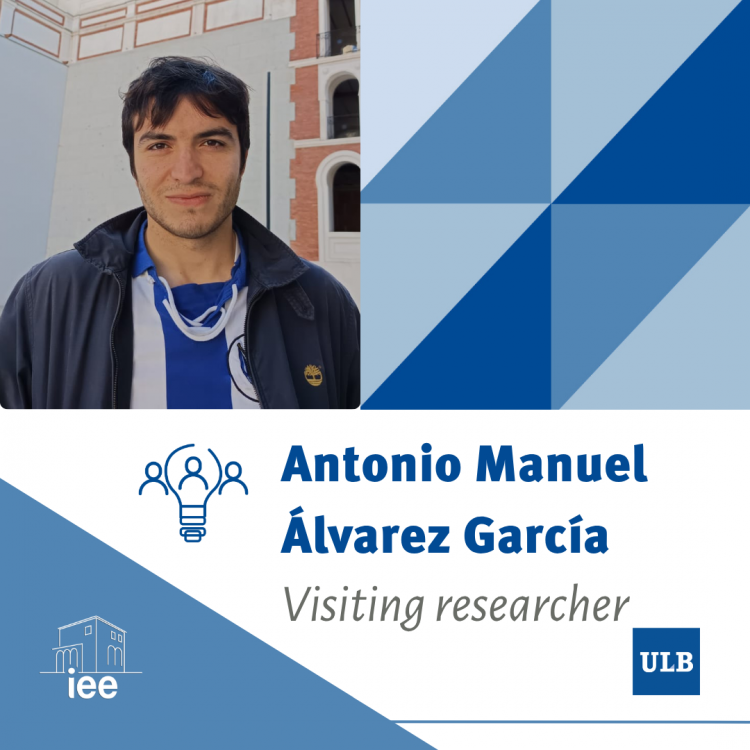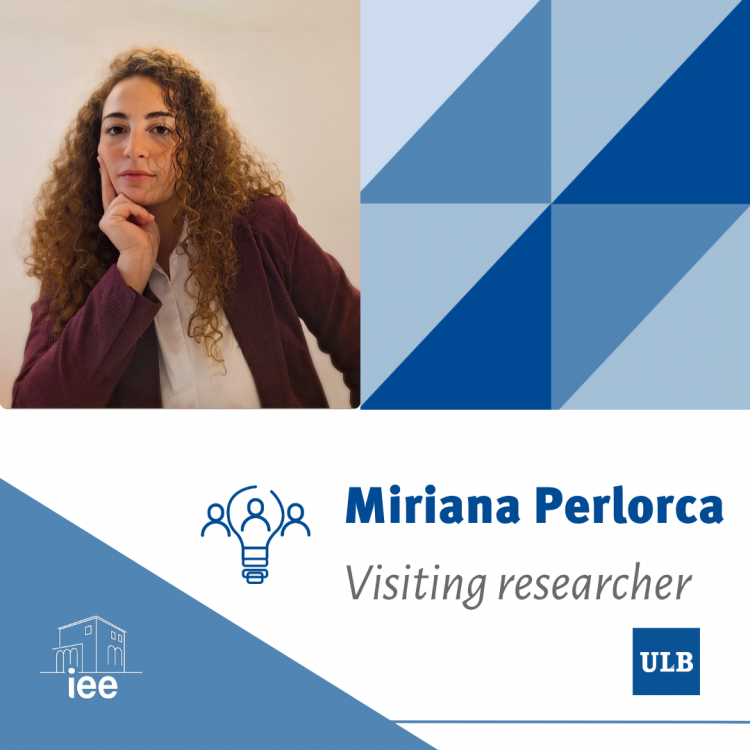Post-Doctoral Research Fellowship on EU External Relations
Institut d’études européennes Horizon Europe ‘RED-SPINEL’
Offer Description
Faculty/Departement : Institut d’études européennes (IEE)
Supervisor: Professor Luca Tomini
Contract Type: International Post-doctoral Fellowship
Contract Length: 2 years (24 months)
Work Time: Full-Time
Start Date: September 2023
Remuneration: approx. 2600 €/month net (+ periodic indexation on inflation)
External Funding Source: RED-SPINEL (HorizonEurope-RIA n°101061621)
Reason behind the recruitment: Research Agenda Associated with WP3 of the Red-SPINEL project
Job Description
The selected candidate will be hired as a full-time Post-Doctoral Fellow.
The selected candidate will take on a research & management mandate on external (EU) funding.
As part of the research team based at the Institut d’études Européennes (IEE), the hired post-doctoral fellow will contribute to the research capacities dedicated to the RED-SPINEL research project, specifically those associated with the project’s 3st WP entitled “EU instruments and the autocratisation challenge in a dissensus-stricken neighbourhood”, under the supervision of prof. Luca Tomini.
The Project
RED-SPINEL is a 36-month long, 3.2 million euro, interdisciplinary, international and intersectoral project involving seven higher education institutions: Université libre de Bruxelles, Libera Università Internazionale degli Studi Sociali Guido Carli, Universiteit van Amsterdam, Universitatea Babeș-Bolyai, HEC Paris, Uniwersytet Mikołaja Kopernika w Toruniu and the University of Warwick. They are joined in the consortium by four non-academic partners: Peace Action, Training and Research Institute in Romania, Milieu Consulting, Magyar Helsinki Bizottság / Hungarian Helsinki Committee and Stichting Nederlands Instituut voor Internationale Betrekkingen Clingendael across eight European countries. The project will analyse the changing nature of dissensus surrounding liberal democracy and its implications for EU supranational policy instruments. It will unpack the inter-connected drivers of contemporary dissensus surrounding liberal democracy. The project will develop a range of scientifically informed policy recommendations and capacity-building efforts able to foster innovative democratic practices able to respond to the present-day dissensus.
Empirically, RED-SPINEL will focus on the key policy instruments and legal mechanisms shaping the EU’s efforts in support of democracy and the rule of law. The studied instruments include the EU rule of law toolbox, the neighbourhood and accession instruments, the European semester, fundamental rights, and judicial instruments, as well as citizen participation platforms. Furthermore, through a series of stakeholder events, RED-SPINEL will flesh out the implications of its findings for public policy stakeholders (i.e. legal professionals, policymakers, European youth) as well as EU instruments aimed at responding to said dissensus. The project’s concept-building effort will centre on the notion of ‘dissensus’ as it explores how contemporary dissensus surrounding liberal democracy differs from previous debates and which more fundamental questions it raises about future democratic practices and the rule of law. Ultimately, RED-SPINEL will provide a typology of said dissensus, map the principal actors of the dissensus in Europe and unpack its two underlying drivers – i.e., heightened internal contestation over liberal democracy and external competition from alternative illiberal models.
It is to this conceptualizing effort that the hired post-doctoral fellow will be attached as a member of the project’s 3rd Work Package (WP3) on ‘EU instruments and the autocratisation challenge in a dissensus- stricken neighbourhood’. Coordinated by the ULB. WP3 will deal with the external dimension of the EU’s actions and strategies seeking to tackle authoritarian challenges in the EU neighborhood. WP3 will directly capture the mechanisms of dissensus at play in the wider European region. The geographical scope of WP3 includes EU interactions with countries covered either by the enlargement agenda (Western Balkans and Turkey) or the European Neighbourhood Policy (ENP). Empirically, WP3 will focus on the processes of autocratisation in selected cases among the 16 ENP partners and the Enlargement countries and on the efficiency of the EU’s Enlargement and (Eastern/Southern) Partnership instruments. The relative efficiency of these instruments will be explored in the areas of electoral monitoring and assistance, support to civil society, counter-autocratisation, anti-corruption drives and the defence of judicial independence.
Building on its findings, WP3 will seek to help to address possible shortcomings in EU neighbourhood instruments and practices by hosting Citizen Fora and Innovation Labs. These will involve researchers as well as EU and Member States level policymakers and civic leaders engaged in two-way dialogues on resisting the autocratisation challenge. Besides exploring the interplay in the EU’s vicinity between specific EU policies and the authoritarian drift, WP3 will devote particular attention to the impact of misinformation or anti-liberal democracy campaigns conducted by third parties on the legitimacy and efficiency of EU instruments.
The purpose of WP3 will be to trace shifts in the EU policy’s approach to these challenges and assess to what extent they have successfully responded to the previously identified forms of dissensus on liberal democracy. To this end, WP3 will:
- assess the relative processes of autocratisation in the Western Balkans and the 16 bilateral ENP partners,
- evaluate relative efficiency of the EU’s Enlargement and Eastern Partnership instruments with regard to: electoral monitoring and assistance, support to civil society, counter-autocratisation, anti-corruption drives and the defence of judicial independence,
- study the impact of misinformation or anti-liberal democracy campaigns conducted by third parties on the legitimacy and efficiency of EU instruments. This focus on enlargement and neighbourhood instruments will also prompt WP3 to take gender implications into account seeing that gender equality, prevention of gender-based violence, and the protection of LGBTQI+ rights are all stated priorities for said instruments, one that has often become a source of dissensus in the target countries.
Work Environment
The Institut d’études européennes (IEE) at the Université libre de Bruxelles (ULB) isa Jean Monnet Centre of Excellence. As such, it is a recognized for its expertise in European Studies. The IEE-ULB carries out its own interdisciplinary research projects. At the same time, it promotes the work of its affiliated members on European issues within the associated research units and centres of its three partner faculties – the Faculty of Philosophy and Social Sciences, the Faculty of Law and Criminology, The Solvay Brussels School of Economics and Management. The IEE-ULB develops an interdisciplinary research agenda established by the Institute’s Research Committee. The current agenda is based on four research themes that are articulated around political sciences, law, economics, history, values and global interactions: Europe as an area of freedom, security & justice; Europe as an area of economic & social regulation; Europe as a community of norms & values; and Europe in the world. The hired Post-doctoral Fellow will be a member of an IEE-based research and management team coordinated by professor R. Coman and dedicated to the implementation, coordination, and promotion of RED-SPINEL.
Essential Missions related to the Function:
in order of importance (and estimated % of work time)
Within the framework of RED-SPINEL the IEE-ULB seeks to hire a full-time Post-Doctoral Research fellow linked to WP3, starting September 2023. Said person would be hire hired by and based at the ULB in Brussels. Under the supervision of prof. Luca Tomini, the hired individual will be directly responsible for part of the scientific agenda included in the project’s programme. The Research Fellow will be involved in the conception, realization, production, and promotion of the promised scientific deliverables.
The withheld researcher will be fully committed to the programme (in terms of working hours and scientific output) and will share in the responsibilities associated with the milestones and deliverables associated with RED-SPINEL.
The hired Post-Doctoral Fellow will contribute to the following missions:
- Mission 1(75%)- Produce original research, draft work to publishable standard, and deliver findings at seminars, workshops, and conferences. This implies:
- Data collection and literature review on the process of autocratization within EU neighbourhood
- Data collection and literature review on efficiency of the EU’s Enlargement and (Eastern and Southern) Partnership Instruments regarding the promotion of democracy
- Research on the core question of WP3, ie. assessing and tracing the shifts in the EU policy’s approach to understand to what extent the EU has successfully responded to the dissensus on liberal democracy and authoritarian turns in the EU neighborhood.
- Contribution to a set of country-level narrative reports on autocratization in the European Neighbourhood
- Leading role in drafting a report on ‘Innovative Practices in the Fight against Autocratization in the European Neighbourhood’ in the 21st Century.
- Contribution to the production set of peer-reviewed article proposals on ‘Actors & Instruments of the EU for meeting the Autocratic Challenge in the Neighbourhood’ under the supervision of prof. Luca Tomini
- Participation to Communication activities of the project (Podcast, Blog, etc.)
- Mission 2(25%)- Organize a series of international scientific workshops on specific topics related either to RED-SPINEL’s overall research agenda, or specifically to its WP1. This implies:
- Active participation to the seminar on ‘Autocratisation Challenge in the Neighbourhood’
- Participation to Consolidation Citizen Forum focussed on ‘Innovative Practices in the Fight against Autocratisation in the European Neighbourhood’
- Participation to the international conferences of the project
Profile
Qualifications required
Ph.D. in political science (or a directly related field such as international relations, sociology, EU studies…) ideally a research profile focused on themes relevant to RED SPINEL.
Mobility Requirement
As the funding is provided as an international post-doctoral fellowship eligible candidates must be in a position to formally expatriate (i.e., move) to Belgium when starting the contract. This means that “the selected candidate must not have resided or carried out their main activity in Belgium for more than 12 months over the past 3years immediately before their recruitment date”
Scientific knowledge and skills
Candidates must have:
- A strong record in qualitative & quantitative research (e.g., interviews, network analysis, documentary analysis…).
- Experience of working in an international environment
- Very good command of English (excellent academic writing skills).
General knowledge and skills
Candidates must:
- Ability to work in a team, to meet deadlines and to combine autonomy with respect of guidelines
- Demonstrate their ability to evolve in a multi-cultural environment.
- Show personal expertise and/or interest in the topic of the project
- Confirm their ability to work in English.
- Be able to coordinate the organisation of scientific events (e.g., conferences, summer schools, workshops, panels international conferences …)
Overview of the knowledge, skills, experience & qualifications required to effectively fulfill the role
|
REQUIREMENTS – The hire must demonstrate: |
ESSENTIAL (E) or DESIRABLE (D) requirements |
MEASURED BY: a) Application Form incl. CV. b) Interview c) Personal Presentation & Motivation |
|
A PhD in a relevant field (political science) |
E |
a, c |
|
Expertise in Democracy, democratization and autocratization studies, Democracy promotion, European Neighbourhood Policy, EU enlargement |
E |
a,b, c |
|
Delivery of research findings at seminars, workshops and conferences |
E |
a, b, c |
|
Ability to organise meetings and workshops |
E |
a, b |
|
Working knowledge of English. Excellent academic writing skills in English are required and a good understanding (passive) of French |
E |
a, b |
Application procedure*
*Additional information can be received by contacting luca.tomini@ulb.be
The successful candidate will be selected based on the quality of the CV, research achievements, motivation and congruence with the project. Each candidate should explain clearly his/her interest in the project and how and why he/she can contribute to its development. Experience and achievements in academic research in areas relevant to the project will be taken into consideration at the time of selection.
Application Files
The application documents are to be consolidated into one single PDF file sent by email to Luca Tomini (luca.tomini@ulb.be).
Application files must include in a single PDF document the following information in English:
- A Filled-out copy of the application form(see below) – Name, affiliation, e-mail and phone number of three referees who can be contacted if necessary
- A separate detailed motivation letter explaining the candidate’s general interest in the project
- A curriculum vitae listing all academic qualifications, relevant research experience and previous publications – You may choose to complete a standard Europass form (https://europa.eu/europass/en)) or not. This is left entirely up to the applicants. Once completed, whether Europass or not, the CV must be included in the single application file
- A copy of the passport/ID, PhD and master diploma
Application Calendar
- Applications are open until01/06/2023
- Interviews with Prof. Luca Tomini will be organised remotely mid-June 2023.
During the interview, they will be asked to make a brief presentation outlining their prospective contribution to the project.
- The final decision will be taken as soon as possible after the interviews.
Equal opportunity policy
ULB’s personnel policy is based on diversity and equal opportunity.
We recruit candidates on the basis of their skills, regardless of their age, gender, sexual orientation, origin, nationality, beliefs, disability, etc.
Would you like to be provided with reasonable accommodation in the selection procedure because of a disability, disorder, or illness? Please contact Marie Botty, the person in charge of diversity aspects for the academic and scientific staff (marie.botty@ulb.be). Be assured of the confidentiality of this information.
More details on the ULB gender and diversity policy are available at https://www.ulb.be/en/about-ulb/gender-equality-at-ulb.
You can find the full set of career provisions for the scientific staff on our website at
http://www.ulb.ac.be/emploi/academique.html
Applications on:
- ULB Portal : https://cwfront.ulb.ac.be/greffe/modules/vac/data/sources/pdf/prod/8266.pdf
- Academic Positions: https://academicpositions.com/ad/universite-libre-de-bruxelles/2023/post-doctoral-research-fellow-eu-instruments-neighbourhood-institut-d-tudes-europ-ennes-universit-libre-de-bruxelles/198005
- Euraxess: https://euraxess.ec.europa.eu/jobs/97469
Photo de Lauren Mancke sur Unsplash




